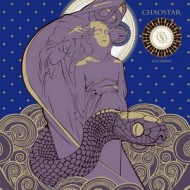 I first heard Chaostar in 1999, when their self-titled album was released shortly after Septic Flesh’s ‘Revolution DNA’ where there was a track with their band name. For those in the know, Chaostar was pretty much Septic Flesh as a neoclassical side project and probably the only reason I bothered giving it a listen. I was glad to have done so then and am just as glad to do so now. Christos Antoniou is the only remaining member 15 years on, but since this is his brainchild the music definitely still has his stamp on it.
I first heard Chaostar in 1999, when their self-titled album was released shortly after Septic Flesh’s ‘Revolution DNA’ where there was a track with their band name. For those in the know, Chaostar was pretty much Septic Flesh as a neoclassical side project and probably the only reason I bothered giving it a listen. I was glad to have done so then and am just as glad to do so now. Christos Antoniou is the only remaining member 15 years on, but since this is his brainchild the music definitely still has his stamp on it.
Opening track is the Chinese character “間” (MA) which is filled with far eastern instruments played by George Diamantopoulos, who takes on traditional instruments duty, along with some discordant yayli tanbur to give the song an uneasy edge as it progresses to include operatic vocals and the sweeping full sound of an organ played by John Thermos.
First point to notice is that while Androniki Skoula’s soprano is awesome, she also manages to emote some pretty gut wrenching tones when being accompanied by George Diamantopoulos’ wind instruments on “Un pensiero per il destino”. Her lyrics are also rather beautiful.
“Sorrow Descending” is haunting with Charalampos Paritsis’ violins, the soft vocals and wind instruments, becoming no less haunting as it builds slowly to include what sounds like a full orchestra and choir. Bravo maestro, bravo.
Morbid Angel’s David Vincent does some guest speaking on “Medea”, as it were, by narrating the prologue. Then the weirdness begins in earnest. The sarod is followed by piano which in turn is followed by dance synths, all over Fotis Benardo’s rather erratic timing signatures on all manner of percussive instruments. Androniki’s German vocals also vary dramatically to accompany the backing music, adding her own sounds and screams to the words for extra depth.
Fernando Ribeiro of Moonspell joins Androniki on the duet “Dilate the Time”, his dark broody voice works well with her higher tones, add to that the slightly more uplifting music and this song is quite easily the “easy listening” track on the album.
The symphonic opening for “Les réminiscences extatiques” combines superbly with the sultry French crooning over the sarod & yayli tanburby, but when the violins and brass join the fray and Androniki starts hitting the high notes, that’s when it sounds truly majestic.
Carl Orff would love bits of “Truth Will Prevail” with its choral arrangements and vocal melodies, but I’m sure he would find the last 40 seconds of 80’s sci-fi battle sounds a little out of place, I know I did.
Singing in her native tongue with subtle piano, yayli tanbur and violin as the entire accompaniment she could ever require, “Όμορφη κόρη” (Fair Maiden) is exquisite in its tenderness with palpable sorrow in her voice.
The first minute of “The Charmer” has some rather breath-taking unaccompanied vocals, but then all of a sudden a funky bass slapping and popping over a jazzy drum offbeat throws things a bit a kilter as the syncopation makes everything feel slightly out of time. But I guess that’s the point.
David Vincent makes his second appearance on “L’idée fixe” with some more narration towards the end of the song, giving it a bit of a cinematic end credits feel after the melancholy melodies crescendo as if for an epic scene.
I have “Misery’s King” as a bonus track on my ‘Revolution DNA’ reissue and on Chaostar’s ‘Underworld’ where Sotiris’ vocals with piano accompaniment are replaced with a slightly less bleak version containing drums and sarod, then keyboards warm it up further in much the same way Androniki’s voice does.
I, for one, am pretty sure that the bonus part of bonus track “Canticles 2” is a bit of a misnomer, but that’s primary because I’m not a fan of repetitive dance beats or techno/rave sounding synths. So while Androniki’s vocals are the songs only saving grace, even they get processed considerably to add to the dancey feel of the track. I guess there had to be one Amomima on the album, and for me, this is it.
(8/10 – Marco Gaminara)

Leave a Reply